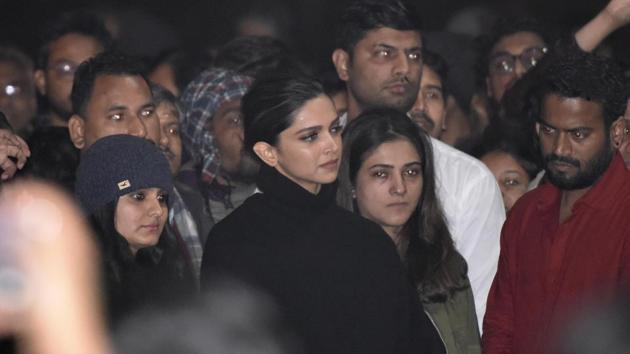Why Deepika Padukone’s presence in JNU needs special mention | Opinion
Starting from Prithviraj Kapoor, many stars have done their bit for the political leaders and their agenda.
Politics has always been an unwritten script in India’s Hindi film industry. But for the first time, we see a breed of young film stars making an unabashed entry in the world of political protests.

Bollywood’s top actress Deepika Padukone’s guest appearance at the JNU on Wednesday after the much-criticised violence unleashed by masked goons in the country’s premier university was the latest in the string of protests that saw many leading lights of Hindi films hitting the street in the recent days.
Anurag Kashyap, Farhan Akhtar, Richa Chadda, Swara Bhaskar, Vishal Bhardwaj are among those who hit the streets while many others have remained critical of the current state of affairs on social media.
Also Watch | Deepika Padukone visits JNU to support students protesting violence
But is this the first time Bollywood stars are involved in nation’s politics? The answer is simply no.
Starting from Prithviraj Kapoor, the first one of his family who came from Peshawar to build the first family of Bollywood, to Dilip Kumar to Sunil Dutt, many stars have done their bit for the political leaders and their agenda.
Kumar, one of India’s great actors, had not only actively campaigned for V Krishna Menon when the latter contested from North Bombay, some of his films such as Naya Daur was seen by analysts furthering the Nehruvian cause.
Released in 1957, Naya Daur not only had a suggestive title of a new journey of a newly-independent nation, but it showcased rural development, new economic policies and modernisation of India in its own way.
Raj Kapoor, Sunil Dutt and other stars could be regularly seen performing in frontline for the soldiers to boost up their morale. Prithviraj Kapoor, one of the favourite actors of Nehru, accompanied the PM on several tours abroad. Once, Nehru returned from USSR tour and asked Prithviraj, “What is this film Awara (released 1951) your son has made? Stalin was talking about it.”
So, if Akshay Kumar is making films on building toilets and promoting Swachh Bharat - a pet idea of PM Modi - he is only following the footsteps of what Sunil Dutt did in Hum Hindustani (there was even a visual of Nehru attending a Congress meeting).
During the 70s, the relationship between Hindi film took a different turn. In 1971, Gulzar penned a political satire “Haal Chaal theek thaak hai” for his film Mere Apne. The song said, everything is fine in the country except that qualified people don’t have jobs, bribes are allowed and people can even get away with murder. During the Emergency, India’s best playback singer Kishore Kumar was blacked out from Doordarshan and All India Radio as he refused to participate in a Congress event and infuriated Sanjay Gandhi.
But in the 107-year-old history of Bollywood, it has hardly ever happened that a bunch of film directors or even actors - who are more cautious about image - have hit the streets to participate in political protests. And almost all of them are young, new faces of Bollywood even as many senior film personalities have preferred to remain silent.
For the times they are a-changin’ in Mumbai. Welcome to a new, braver Bollywood.






